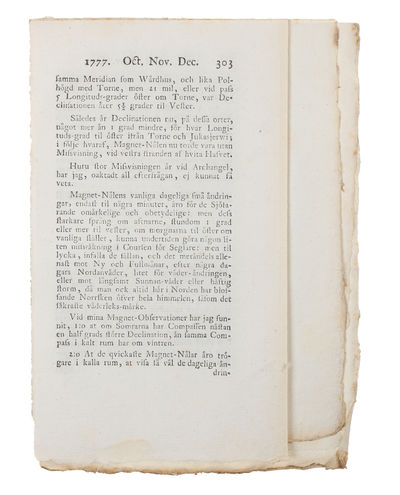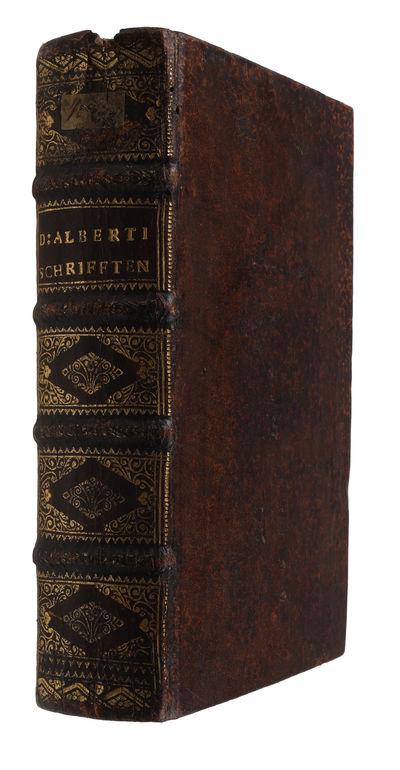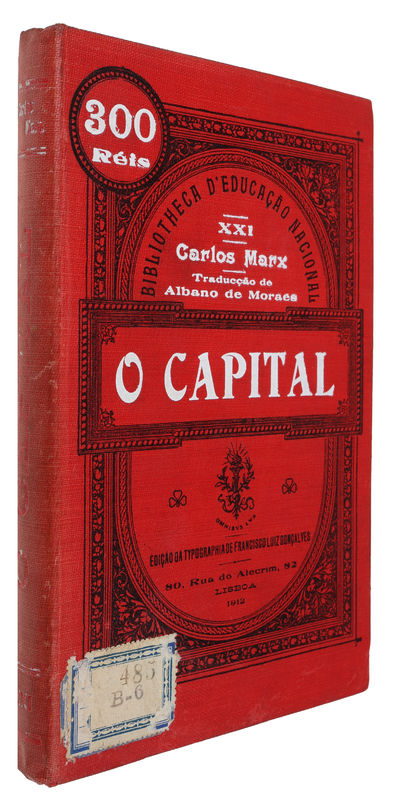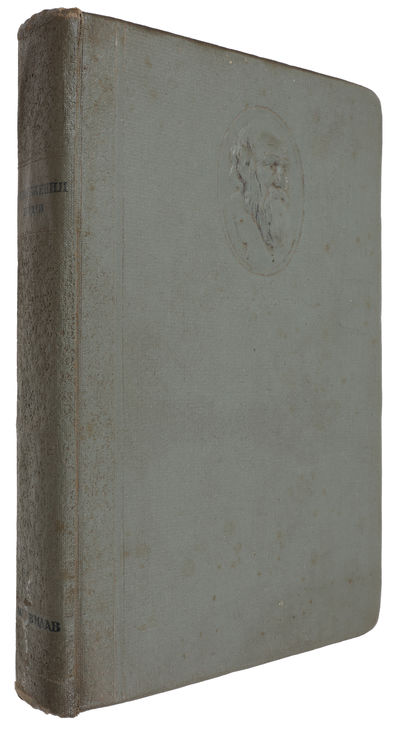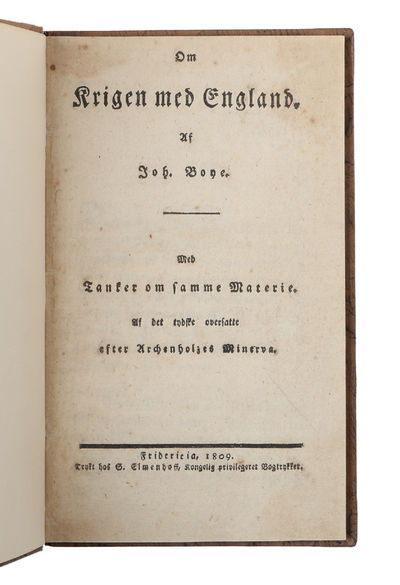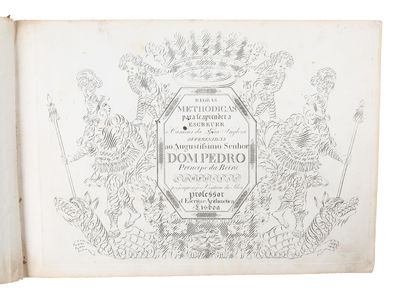DARWIN, CHARLES.
O Proischozhdenii Vodov... [Russian: On the Origin of Species]. Perevel c anglijskago [translated from English by] S.A. Rachinsky. - ["THE MOST IMPORTANT BIOLOGICAL BOOK EVER WRITTEN" (FREEMAN)]
Herman H. J. Lynge & Søn A/S
lyn60791
S.-Peterburg, 1864. 8vo. Bound in a beautiful half calf recent pastiche-binding with marbled papers over boards and elegant gilding to spine. End-papers renewed. Stamp to half-title, title-page and first leaf of text. First leaves evenly browned and dampstain to outer margin affecting last 50 ff. A few occassional brownspots throughout. XIV, 399, (1) pp. + 1 plate with genealogical tree (between pp. 92/93).
First edition of the first Russian translation of Darwin's "Origin of Species", a main reason for the widespread effect of Darwinism in Russia, where the theory met less resistance in the 1860'ies than it did in Western Europe. In Russia, Darwinism had a profound influence not only upon the different sciences, but also on philosophy, economic and political thought, and the great literature of the period. For instance, both Tolstoy and Dostoevsky referenced Darwin in their most important works, as did numerous other thinkers of the period."In 1864, S.A. Rachinsky, professor of plant physiology at St. Petersburg University, produced the first Russian translation of the "Origin". Although not a masterpiece of translation art, the book sold out so quickly that in 1865 it went through a second printing. By this time Darwin's ideas were discussed not only by scientists but also by such popular writers as Dmitri Pisarev and M. A. Antinovich." (Glick, p. 232). Rachinsky began translating the "Origin" in 1862 and wrote an important article on the theories presented in it, while working on the translation. This article and the translation of the "Origin" into Russian were responsible for the great success and rapid, widespread knowledge of Darwinian theory of evolution in Russia. "Darwin was concerned that the "Origin of Species" reach naturalists across the world, but translations of that complicated work raised problems for Darwin. If he found it difficult to make the reader "understand what is meant" in England and America, at least in those two countries he and the reader were discussing the "Origin of Species" in the same language. Foreign language editions raised not only the thorny question of translating Darwinian terms, but also the problem of translators, who often thought it proper to annotate their editions to explain the "significance" of Darwinism. The first Russian translation of the "Origin of Species" (1864) appeared, however, without any comment whatever by the translator, Sergei A. Rachinsky, professor of botany at the University of Moscow. Rachinsky had begun the translation in 1862 and published an article on Darwinism while continuing work on the translation in 1863." (Rogers, p. 485). In the year of publication of the translation, 1864, Pisarev wrote a long article in "The Russian Word", which purports to be a review of this translation; the critic complains about the absence of notes and commentaries by the translator. Pisarev furthermore points to several errors in the translation and to numerous infelicities of expression. Acknowledging the importance of the work, however, and of the spreading of Darwinism in Russia, he goes on in his own essay to provide a much more popular account of Darwin's theory and to impress upon his readers its revolutionary significance.Nikolai Strakhov also reviewed the translation immediately upon publication, acknowledging the effect it would have. Strakhov, however, recognized potential dangers inherent in the theory and expressed them in his review of Rachinsky's translation. He praised the work for its thoroughness and rejoiced in the evidence that man constituted the highest stage of organic development; but then he went on to argue that by moving into questions of philosophy and theology, the Darwinists were exceeding the limits of scientific evidence. Like Pisarev, Tolstoy enthusiastically embraced Darwinism. "The first mention of Darwin in Tolstoy's literary "Nachlass" is found in one of the drafts to "War and Peace". There Darwin is listed, apparently quite favorably, among leading thinkers "working toward new truth" [...] Thus by the late 1860's the name of Darwin as a leading scientist was already familiar to Tolstoy and duly respected." (McLean, p. 160). A fact which is often overlooked is that Tolstoy actually knew Rachinsky quite well. Interestingly, it was in a letter to Rachinsky, in reply to a question about the structure of "Anna Karenina", that Tolstoy made the famous statement (that all Tolstoy scholars and lovers know by heart): "I am proud of the architecture - the arches are joined in such a way that you cannot discover where the keystone is". Like Strakhov, however, Dostoevsky, acknowledging the significance of the "Origin", saw the dangers of the theory. In the same year as the publication of Rachinsky's translation, he lets the narrator in "Notes from Underground" (1864) launch his attack on Darwinism , beginning: "As soon as they prove you, for instance, that you are descended from a monkey, then it's no use scowling, you just have to accept it."In "Crime and Punishment" (two years later, 1866) the Darwinian overtones inherent in Raskolnikov's theory of the extraordinary man are unmistakable. He describes the mechanism of "natural selection," where, according to the laws of nature, by the crossing of races and types, a "genius" would eventually emerge. In general, Darwinian themes and Darwin's name occur in many contexts in a large number of Dostoevsky's works.Freeman 748. See: James Allen Rogers: The Reception of Darwin's Origin of Species by Russian Scientists. In: Isis, Vol. 64, No. 4 (Dec., 1973), pp. 484-503.Thomas F. Glick: The Comparative Reception of Darwinism. 1974.Hugh McLean: In Quest of Tolstoy. 2008.
First edition of the first Russian translation of Darwin's "Origin of Species", a main reason for the widespread effect of Darwinism in Russia, where the theory met less resistance in the 1860'ies than it did in Western Europe. In Russia, Darwinism had a profound influence not only upon the different sciences, but also on philosophy, economic and political thought, and the great literature of the period. For instance, both Tolstoy and Dostoevsky referenced Darwin in their most important works, as did numerous other thinkers of the period."In 1864, S.A. Rachinsky, professor of plant physiology at St. Petersburg University, produced the first Russian translation of the "Origin". Although not a masterpiece of translation art, the book sold out so quickly that in 1865 it went through a second printing. By this time Darwin's ideas were discussed not only by scientists but also by such popular writers as Dmitri Pisarev and M. A. Antinovich." (Glick, p. 232). Rachinsky began translating the "Origin" in 1862 and wrote an important article on the theories presented in it, while working on the translation. This article and the translation of the "Origin" into Russian were responsible for the great success and rapid, widespread knowledge of Darwinian theory of evolution in Russia. "Darwin was concerned that the "Origin of Species" reach naturalists across the world, but translations of that complicated work raised problems for Darwin. If he found it difficult to make the reader "understand what is meant" in England and America, at least in those two countries he and the reader were discussing the "Origin of Species" in the same language. Foreign language editions raised not only the thorny question of translating Darwinian terms, but also the problem of translators, who often thought it proper to annotate their editions to explain the "significance" of Darwinism. The first Russian translation of the "Origin of Species" (1864) appeared, however, without any comment whatever by the translator, Sergei A. Rachinsky, professor of botany at the University of Moscow. Rachinsky had begun the translation in 1862 and published an article on Darwinism while continuing work on the translation in 1863." (Rogers, p. 485). In the year of publication of the translation, 1864, Pisarev wrote a long article in "The Russian Word", which purports to be a review of this translation; the critic complains about the absence of notes and commentaries by the translator. Pisarev furthermore points to several errors in the translation and to numerous infelicities of expression. Acknowledging the importance of the work, however, and of the spreading of Darwinism in Russia, he goes on in his own essay to provide a much more popular account of Darwin's theory and to impress upon his readers its revolutionary significance.Nikolai Strakhov also reviewed the translation immediately upon publication, acknowledging the effect it would have. Strakhov, however, recognized potential dangers inherent in the theory and expressed them in his review of Rachinsky's translation. He praised the work for its thoroughness and rejoiced in the evidence that man constituted the highest stage of organic development; but then he went on to argue that by moving into questions of philosophy and theology, the Darwinists were exceeding the limits of scientific evidence. Like Pisarev, Tolstoy enthusiastically embraced Darwinism. "The first mention of Darwin in Tolstoy's literary "Nachlass" is found in one of the drafts to "War and Peace". There Darwin is listed, apparently quite favorably, among leading thinkers "working toward new truth" [...] Thus by the late 1860's the name of Darwin as a leading scientist was already familiar to Tolstoy and duly respected." (McLean, p. 160). A fact which is often overlooked is that Tolstoy actually knew Rachinsky quite well. Interestingly, it was in a letter to Rachinsky, in reply to a question about the structure of "Anna Karenina", that Tolstoy made the famous statement (that all Tolstoy scholars and lovers know by heart): "I am proud of the architecture - the arches are joined in such a way that you cannot discover where the keystone is". Like Strakhov, however, Dostoevsky, acknowledging the significance of the "Origin", saw the dangers of the theory. In the same year as the publication of Rachinsky's translation, he lets the narrator in "Notes from Underground" (1864) launch his attack on Darwinism , beginning: "As soon as they prove you, for instance, that you are descended from a monkey, then it's no use scowling, you just have to accept it."In "Crime and Punishment" (two years later, 1866) the Darwinian overtones inherent in Raskolnikov's theory of the extraordinary man are unmistakable. He describes the mechanism of "natural selection," where, according to the laws of nature, by the crossing of races and types, a "genius" would eventually emerge. In general, Darwinian themes and Darwin's name occur in many contexts in a large number of Dostoevsky's works.Freeman 748. See: James Allen Rogers: The Reception of Darwin's Origin of Species by Russian Scientists. In: Isis, Vol. 64, No. 4 (Dec., 1973), pp. 484-503.Thomas F. Glick: The Comparative Reception of Darwinism. 1974.Hugh McLean: In Quest of Tolstoy. 2008.
Adresse:
Silkegade 11
DK-1113 Copenhagen Denmark
Telefon:
CVR/VAT:
DK 16 89 50 16
Email:
Web:
![O Proischozhdenii Vodov... [Russian: On the Origin of Species]. Perevel c anglijskago [translated from English by] S.A. Rachinsky. - ["THE MOST IMPORTANT BIOLOGICAL BOOK EVER WRITTEN" (FREEMAN)] (photo 1)](https://d3525k1ryd2155.cloudfront.net/h/001/435/1587435001.0.l.jpg)
![O Proischozhdenii Vodov... [Russian: On the Origin of Species]. Perevel c anglijskago [translated from English by] S.A. Rachinsky. - ["THE MOST IMPORTANT BIOLOGICAL BOOK EVER WRITTEN" (FREEMAN)] (photo 2)](https://d3525k1ryd2155.cloudfront.net/h/001/435/1587435001.1.l.0.jpg)
![O Proischozhdenii Vodov... [Russian: On the Origin of Species]. Perevel c anglijskago [translated from English by] S.A. Rachinsky. - ["THE MOST IMPORTANT BIOLOGICAL BOOK EVER WRITTEN" (FREEMAN)] (photo 3)](https://d3525k1ryd2155.cloudfront.net/h/001/435/1587435001.2.l.0.jpg)
